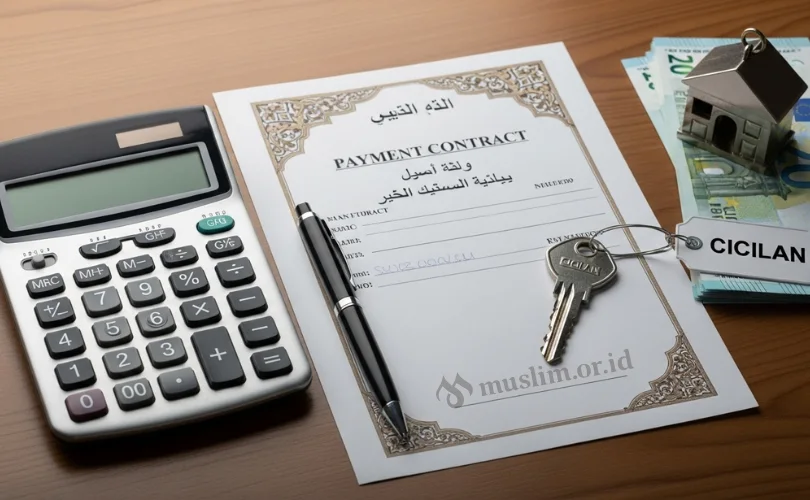When discussing a contract in muamalah, we certainly cannot be separated from the legal provisions. Before more in knowing the debt of receivables in detail, it helps us know in advance about the law of the debt of the receivable itself.
Accounts Receivable Law
Discussion on the Law of Debt Receivables can be divided into two main discussions; legally proposal and legally Wing’i.
First, legally proposal
The point is the debt of receivables seen from the law offer, namely law that contains loading to a person Mukallaf. Such as compulsory law, sunnah, makruh, haram, and mubah.
In this case, law proposal related to the debt problem of receivables is divided into two sides:
Debt Giver Side
When viewed from the side of the debt giver, then the original law is sunna. This means that giving debt to those who need to be a practice of regulated. As told by the hadith by Ibn Majah and stated by Sheikh al-Albani, from Abdullah bin Mas’ud, the Prophet sallallaahu ‘alaihi wa sallam say,
No Muslim lent a Muslim who has two times, but he believes in him once
“It is not Muslim who lent it to Muslims twice, except as the first gift.” (Hours. Ibn Majah)
The reward that was promised when helping people who had difficulty in financial terms were certainly very large. Therefore, giving debt to people in need including pious practices and includes the practice of sunna. Who among us does not want to be facilitated in the world and in the hereafter?
From Abu Hurairah, Prophet sallallaahu ‘alaihi wa sallam say,
Anyone who breathes from believers is the trouble from the ruler of the world and the last
“Whoever eliminates one difficulty of another believer from his difficulty in the world, surely Allah will eliminate from him one difficulty on the Day of Judgment. Whoever relieves people who are troubled (in his debt), surely Allah will alleviate for him (his affairs) in the world and the hereafter.” (HR. Muslim)
Often nature Benel (Pelow) prevents someone from doing good to fellow Muslims. The wealth in his hand seems to be his only one and cannot be used by others, even relatives or families who are still bloodstream.
When his brother came to borrow money because of a very, financial, chaotic need, and really needed-until his brother was willing to humble himself in front of him so that a nominal loan could be given not how much for him-instead of being given a loan, which was precisely he fooled his brother for various reasons. The point is that he does not want to lend.
Do you not want to be appreciated by God Story As a prophet sallallaahu ‘alaihi wa sallam promise above? Don’t you want to always be helped by God for helping your brother? Prophet sallallaahu ‘alaihi wa sallam say,
And God is in my eyes, what is in the eyes of his brother
“God will always help His servants as long as the servant helps his fellow Muslims.” (HR. Muslim)
If you have wealth and God gives advantages to your treasure, then it becomes a necessity for you to help your brother who needs by lending money for him. Of course this is better, than he begged to others.
Back to the law proposalIndeed, debt receivables can change the law in terms of debt giving in accordance with existing conditions. Sometimes it can be mandatory, sunna, makruh, haram, and mubah.
Can be must If to save lives, such as for treatment that requires expensive costs; to buy food for people who are starving; Or when there is no other choice. Like someone who is threatened to surrender a treasure; If not, it will be killed, and so forth. That is, there is no other way except by lending it.
In the case above, lending money into an obligation. Of course, this obligation is for the owner of more assets. So that the category that requires someone to lend it is someone who if he lent his property to others, it will not make the lender or his family lack wealth or fall into the same or even worse difficulties.
Likewise, it can be something Makruh even Haram, If lending it, it causes ain the city-greater. Like lending things that are haram, drink khamr, Play gambling, adultery, and so forth. Or if the debt giver knows that the borrower will not pay off his debts, run away, and so forth. At that time, the law could be makruh and even haram to lend it.
The owner side
When viewed from the side of the owner, then his original law is a chubby if he feels capable of paying it with an estimate he has so many property that can be expected to pay and he is determined to pay. If this is not the case, it is not allowed to borrow as long as it is not emergency.
Abu Hurairah Radiyallahu ‘anhu Ever told a story,
That God’s messengers, may God’s prayers and peace be on him, will come to those who die from debt to their religion, he pray, and He says to Muslims, peace is your friend, so when God opens the conqueror, he says: He dies because of believers, so you will leave debt, so I will put money, and anyone left from believers who are in Woundsing, and whoever is in Woundsing, and whoever is inherited, and whoever is in Woundsing, and anyone inherited, and whoever is in Woundsing, and whoever is in Woundmors, and whoever is in Woundse,
“Ever came to the Prophet Sallallaahu ‘Alaihi wa Sallam of the deceased (corpse) who left the debt. He asked,” Did he leave the property to pay his debt? “If it is said that the body leaves something to melodate its debt, then he will do it.
When God has opened victory to him in various countries, he said, “I am more important to guarantee that people of faith than themselves. So anyone who dies from among the believers, then leaves debt, I am the one who is obliged to pay it. And anyone who leaves wealth, then the treasure is for his heirs.” (Muttafaqun ‘alaih)
This hadith shows the lesson Shoullahu ‘alahi wa sallam To avoid debt.
Second, legally Wing’i
Law Wing’i from the problem of debt receivables is Legitimate The law is fulfilled if the conditions are met. If not fulfilled, then no Legitimate the law.
Thus relating to the law of debt receivables. Hope it is useful Wallahu a’lam.
[Bersambung]
Back to section 1
***
Depok, 26 Muharam 1447/21 July 2025
Writer: Zia Abdurrofi
Article Muslim.or.id
Reference:
Fiqhul mu’amalat al-maliyah al-muyassar, Dr. Abdurrahman bin Hamud.
Sahih Fiqh Sunnah (Volume 5), Karya Abu Malik Kamal Bin Sayyid Salim.
Al-mukhtashor fil mu’amalat, The work of Prof. Dr. Khalid bin Al-Musayqih.
Game Center
Game News
Review Film
Rumus Matematika
Anime Batch
Berita Terkini
Berita Terkini
Berita Terkini
Berita Terkini
review anime



